Key takeaways:
- Hospital ministry provides profound emotional support, fostering hope and resilience for both patients and volunteers.
- Mentorship enhances personal growth, emphasizing active listening, boundary-setting, and vulnerability in building deeper connections.
- Effective mentoring relationships are founded on open communication and mutual growth, creating a supportive environment for all involved.
- Future goals include strengthening community engagement, emphasizing emotional wellness, and promoting leadership development within hospital ministry teams.
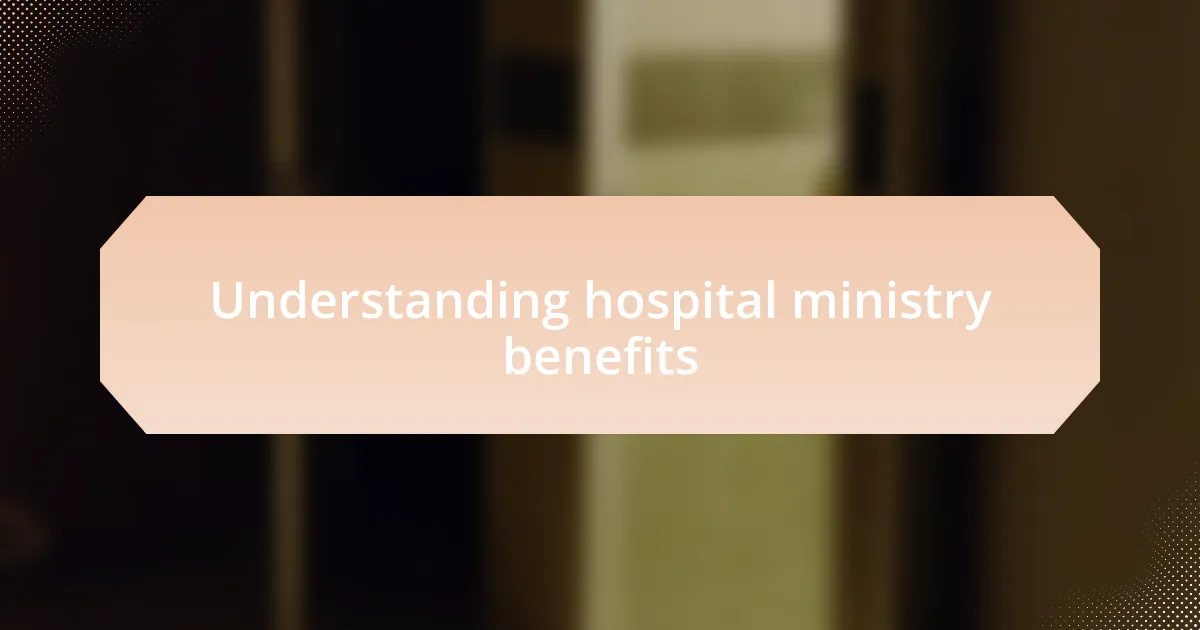
Understanding hospital ministry benefits
When I first started participating in hospital ministry, I quickly discovered the profound emotional support it offers to patients and their families. Imagine sitting with someone who feels completely alone during a difficult diagnosis. That instant connection, the warmth of just being present, can be incredibly uplifting—for both the patient and the volunteer. It’s truly a reminder that human connection, even in the starkest of settings, can spark hope.
Another benefit that struck me was the perspective shift it gave me on life and faith. Engaging with individuals facing serious health challenges often makes you reevaluate your own experiences. Have you ever found comfort in hearing someone’s story, even when it’s fraught with pain? I certainly have. These moments not only fuel my passion for ministry but also deepen my understanding of resilience and the importance of empathy.
Furthermore, I’ve seen firsthand the impact of spiritual care on hospital staff. One time, I noticed a weary nurse pause during a busy shift to share her burden. After a brief conversation, it’s like a weight had been lifted—her spirit seemed rekindled. This exchange emphasized to me how vital it is to care for those who care for others. The benefits of hospital ministry extend far beyond patients; they ripple through entire healthcare teams, fostering a more compassionate environment for everyone involved.
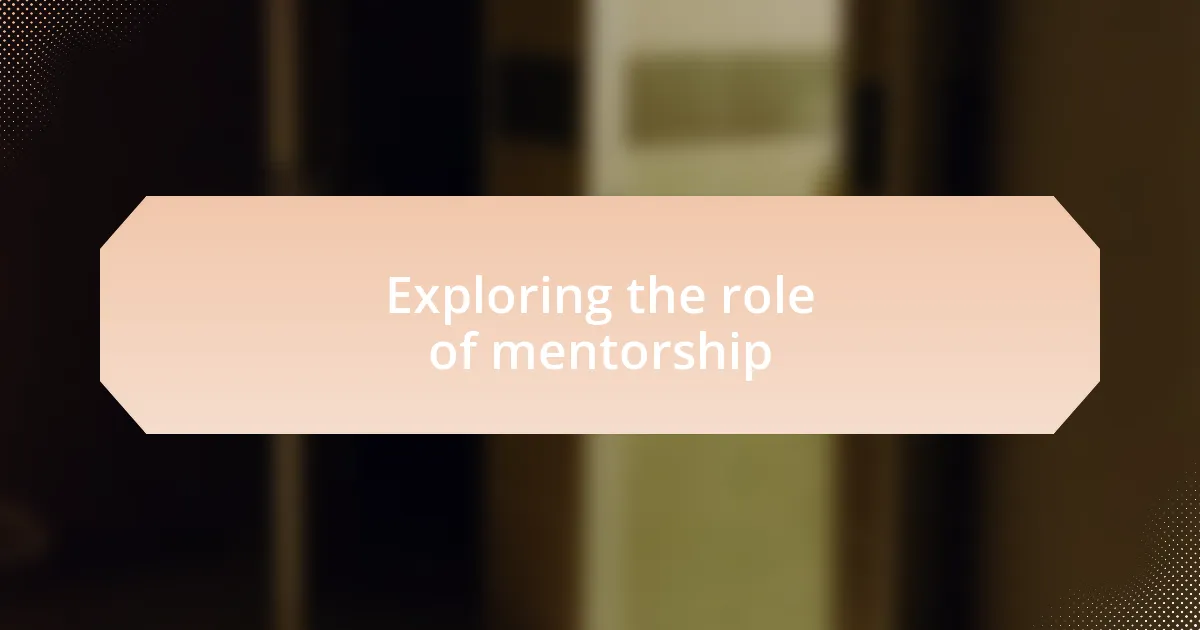
Exploring the role of mentorship
Mentorship in hospital ministry can be a transformative experience, not just for the mentee but also for the mentor. I remember when I was paired with a seasoned chaplain, whose quiet strength and wisdom influenced my approach to spiritual care profoundly. Have you ever had someone believe in your potential when you weren’t sure you had any? That belief can be a powerful catalyst for growth.
The bond that develops in mentorship goes beyond mere guidance; it becomes a shared journey of faith and empathy. I often found myself reflecting on shared moments, like when we prayed together with a family facing difficult news. Those experiences shaped my understanding of spiritual support and revealed how mentorship can enrich the emotional fabric of hospital ministry.
By receiving feedback from my mentor, I learned to navigate the complexities of human emotions better, ensuring that my responses were sensitive and appropriate. Have you felt the weight of someone else’s pain and struggled to find the right words? In those times, mentorship offered me the clarity and confidence to respond effectively, illustrating the vital role mentors play in developing capable and compassionate healthcare ministers.
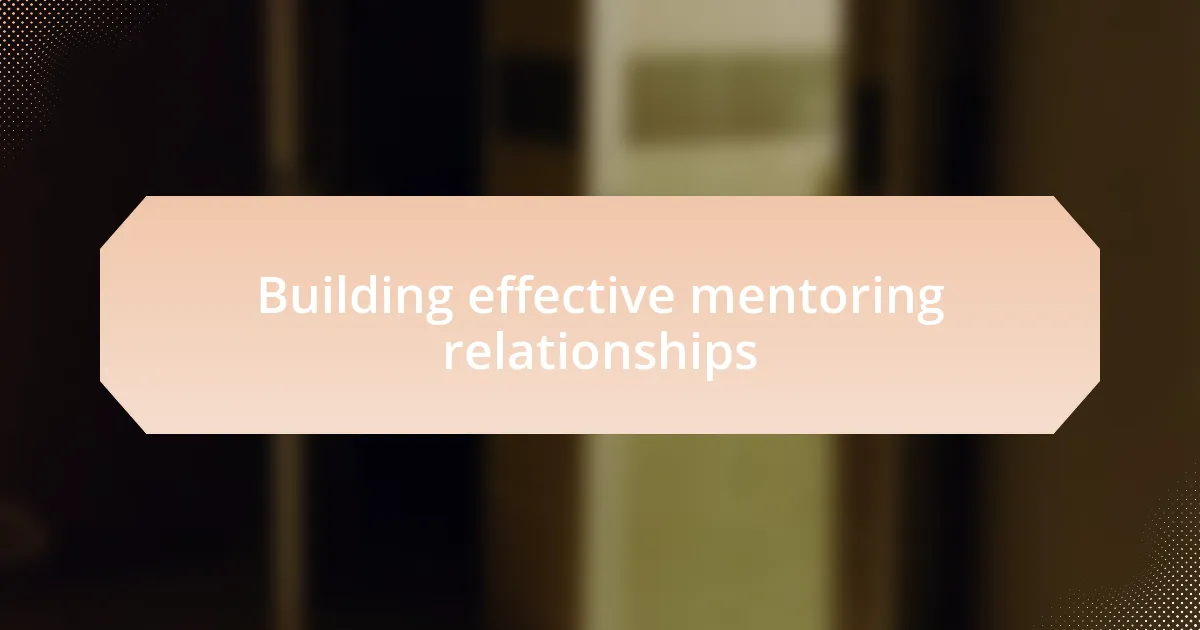
Building effective mentoring relationships
Building effective mentoring relationships begins with open communication. I recall a time when I sat down with my mentor to discuss my fears about leading a prayer session. The way she listened without judgment and encouraged me to voice my concerns created a safe space where I felt valued. Have you experienced the difference that genuine attention can make in such vulnerable moments?
Trust is another cornerstone of a successful mentoring relationship. I vividly remember a day in the hospital chapel, where my mentor shared a deeply personal story from her early days in ministry. That moment of vulnerability not only deepened my respect for her but also made me more willing to share my own challenges. How do you build trust in your relationships? I find that sharing personal stories fosters connection and helps break down emotional barriers.
Lastly, I’ve learned that mentorship thrives on mutual growth. I often think about how my mentor’s enthusiasm for learning from new experiences inspired me to stay curious and open-minded. There were times when I brought fresh ideas to our conversations, igniting engaging discussions that benefited us both. Isn’t it enriching when both parties can learn from each other? Mentoring is truly a two-way street, making each step of the journey more rewarding.

Lessons learned from my mentors
The first lesson I learned from my mentors is the importance of active listening. During a particularly challenging day in the hospital, I showed up with frustration about our team’s dynamics. My mentor simply listened, nodding and encouraging me to expand on my feelings. This experience taught me that sometimes, all someone needs is a compassionate ear to help them sort through their thoughts. How often do we think we need to provide solutions when really, listening is the greatest gift we can offer?
Another significant lesson involves setting boundaries. I fondly recall a time my mentor gently reminded me that it’s okay to say no. I had taken on too many commitments and felt overwhelmed. Her words resonated deeply: “You can’t pour from an empty cup.” This acknowledgment of self-care not only enhanced my ability to serve others but also instilled a sense of balance in my ministry work. Have you ever felt like you were drowning in responsibilities? Learning to prioritize has been a game-changer for me.
Lastly, I learned that vulnerability cultivates deeper connections. I remember a moment when my mentor shared her past struggles with doubt and fear. As she spoke, I felt a rush of empathy. It was as if she was giving me permission to be imperfect. In that safe space, I opened up about my own insecurities, which sparked a profound discussion that drew us even closer. Isn’t it fascinating how opening up can bridge gaps and foster trust? Moments like these remind me that our shared humanity is what truly strengthens our mentoring bonds.
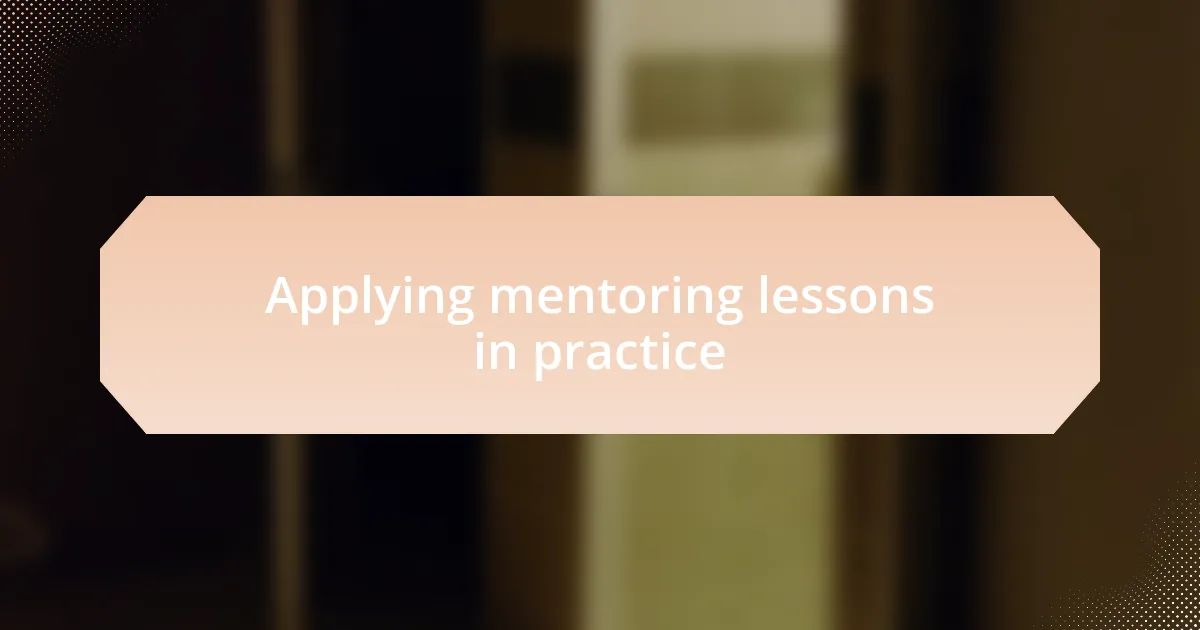
Applying mentoring lessons in practice
Active listening isn’t just a technique; it’s a practice I have consciously integrated into my daily interactions. One day, after a long shift, I found myself in a conversation with a colleague who was visibly distressed. Instead of rushing to give advice, I simply asked questions and let them share their thoughts. The relief in their voice as they talked through their worries struck me. This moment solidified for me that true mentorship involves creating an environment where individuals feel safe to express themselves.
When it comes to setting boundaries, I frequently reflect on the power of saying no. I vividly recall a period when I hesitated to decline additional responsibilities during a busy season. It took a gentle reminder from my mentor to consider the importance of preserving my well-being. I remember the weight lifting as I declined an extra project. It felt empowering! Have you ever felt guilty for prioritizing your own time? That experience reshaped my understanding of balance and how it directly impacts the quality of care I provide in the hospital.
Embracing vulnerability has been another pivotal lesson. There was a time during our weekly meetings when a peer bravely opened up about their feelings of inadequacy. Inspired, I shared my own struggles with burnout—something I had kept hidden. That day, a collective sigh of relief echoed in the room; it was a shared moment of honesty. Have you experienced the freedom that comes from being vulnerable? This act of openness not only strengthened our camaraderie but also reinforced our commitment to support one another in a ministry that often demands so much.
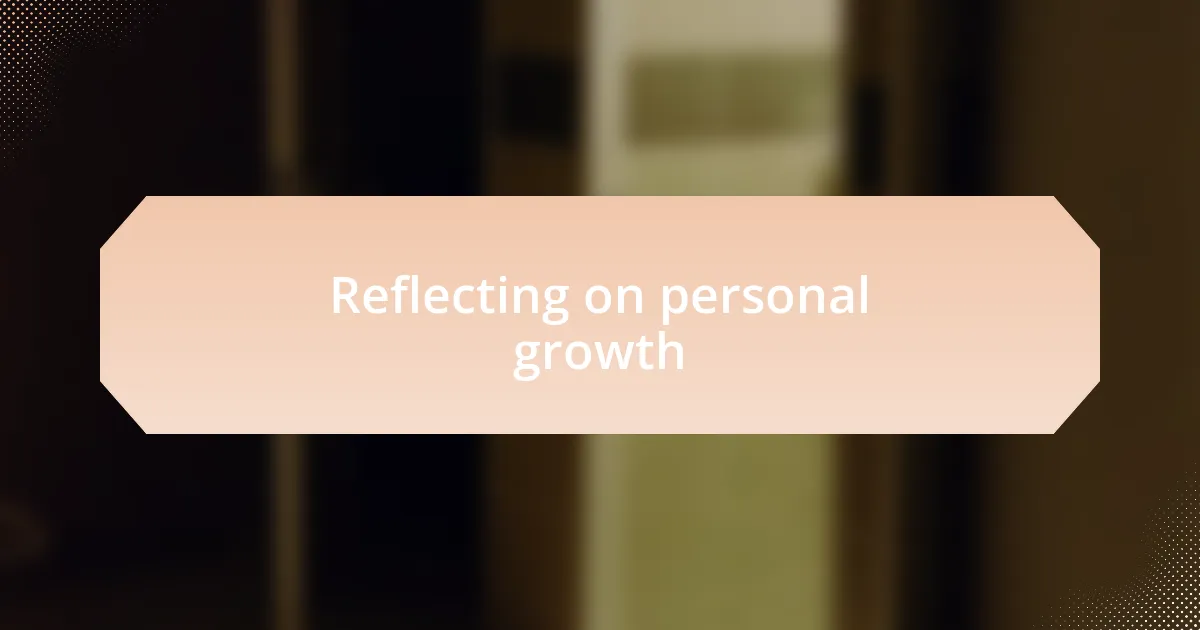
Reflecting on personal growth
Reflecting on personal growth has been a transformative journey for me, particularly through my mentoring relationships. I recall a moment when I was faced with a difficult situation that challenged my assumptions about leadership. After a heart-to-heart with my mentor, I realized that effective leadership isn’t about having all the answers; it’s about fostering an environment where others feel valued and empowered. This insight shifted my approach, making my interactions with team members more collaborative and fulfilling.
I often think about the subtle yet profound changes in my approach to conflict. In a recent discussion with a mentor, I was reminded of a time when I allowed my emotions to cloud my judgment during disagreements. Now, I practice intentional reflection before responding, which has drastically improved my ability to resolve conflicts positively. It has made me wonder—how many misunderstandings could be avoided if we simply took a moment to pause and reflect?
One lesson that particularly resonates with me is the importance of gratitude. I distinctly remember a mentor who encouraged me to keep a gratitude journal during challenging times. Reflecting on those entries brings back memories of kindness I might have overlooked, like a colleague’s support on a tough day. This practice not only cultivates a resilient mindset but also compels me to recognize how connected we are in our ministry. When was the last time you paused to appreciate the small acts of kindness around you? It can be a game-changer in fostering a positive environment.
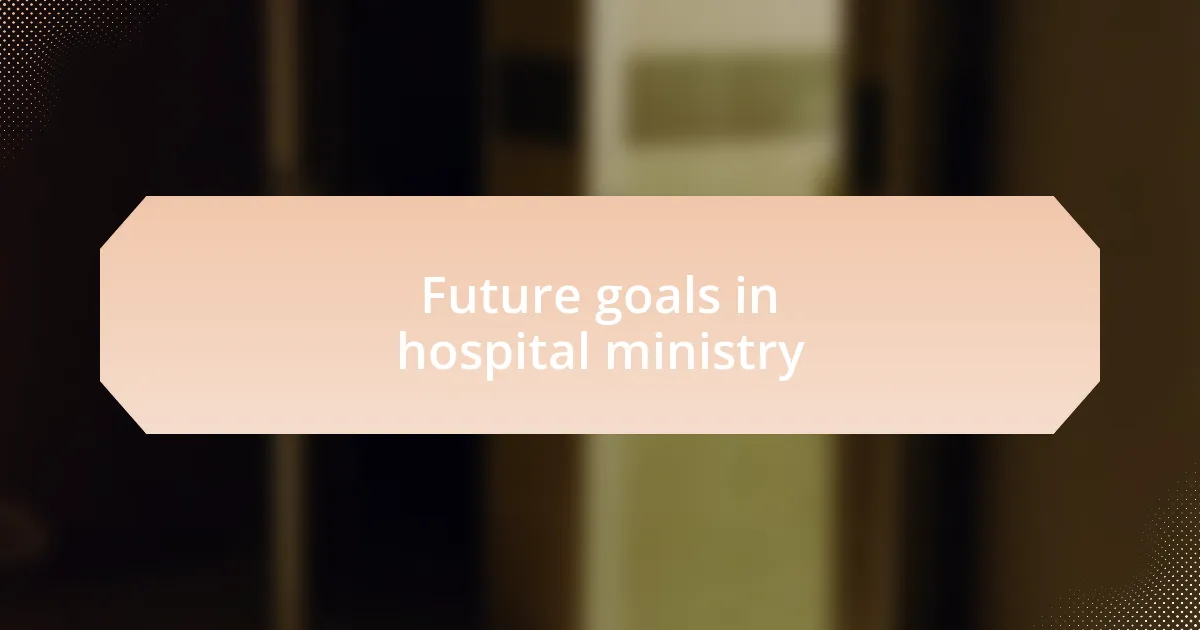
Future goals in hospital ministry
As I look toward the future of hospital ministry, my primary goal is to strengthen community engagement. Reflecting on my mentoring experiences, I’m reminded of a time when I helped organize a health fair that brought together patients and local providers. It showed me how vital it is to foster these connections—how can we effectively support our patients if we’re not actively listening to their needs and integrating the community’s voice?
Another aim I have is to emphasize emotional wellness in our services. I often think about the profound impact of mental health resources during hospital visits. When I was a mentee, I learned about the importance of offering compassionate care that recognizes the emotional struggles of patients. By integrating support systems, such as counseling and peer groups, we can create a more holistic approach to healing. Have you ever considered how a little emotional support can transform a patient’s experience?
Lastly, I strive to promote leadership development within our hospital ministry teams. During my mentoring journey, I realized that investing in others is key to sustainable growth. I remember the joy of mentoring a new volunteer who blossomed into a confident member of our team. How different might our ministries be if we prioritized mentoring as a core practice? I believe nurturing future leaders will not only enrich our ministry but also ensure that we serve our community more effectively.